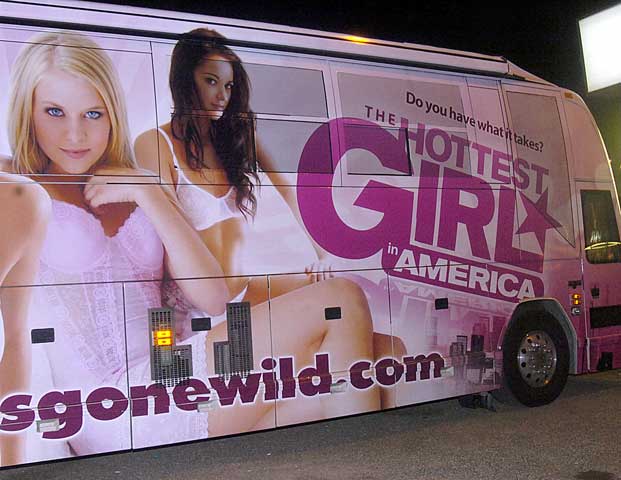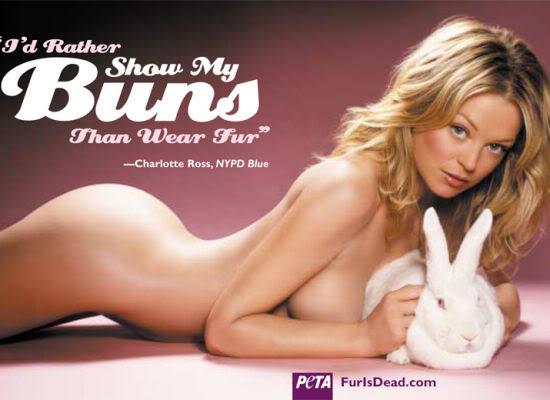Not Safe for Work: Contains a pornographic “pin-up” drawing.
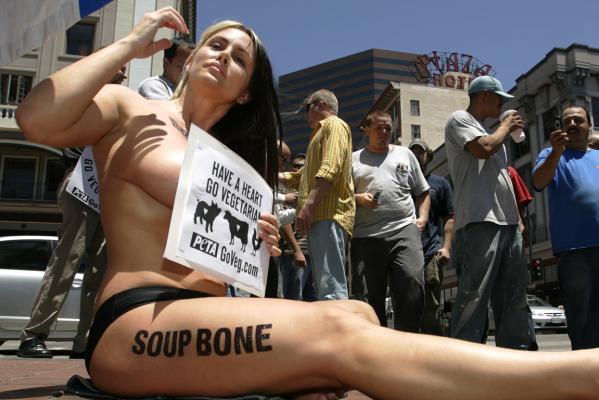
Some time ago, I published a piece with Feminspire on the spread of sexualized Nonhuman Animal advocacy. In doing so, I spotlighted a small organization in Wisconsin that had either encouraged or otherwise allowed two young women—naked from the waist up with cabbage leaves fastened to their breasts—to hand out “I SPONSORED A PUSSY” stickers to passerby who donated.
I wrote the article for two reasons. First, the “cabbage chicks” stunt demonstrated how normalized the sexualization of female volunteers has become in the Nonhuman Animal rights movement. In fact, I suggest that this tactic amounts to little more than prostitution (these women are displayed as sexual objects in public places without compensation to raise money for the organization they represent).
I also published the piece to reopen the dialogue. You see, the organization had blocked out any discussion of the wider implications of its tactics. As is often the case in the movement, these important conversations are shut down.
Shortly thereafter, the president of the organization, who had blocked myself and my colleagues from participating in a polite (no, really) discussion on its Facebook page, visited the Vegan Feminist Network Facebook page along with one of the female volunteers. They took our criticism of their approach to be, among other things, an individual attack. The president reassured us that the young women who participated in this promotional stunt were doing so of their own personal choice.

But social scientists implore us to understand that there is no “choice.”
This isn’t about the individual. Instead, this is about systems of oppression and social structures that shape our behavior and limit what choices are available to us based on our social identity. If you are a young, thin, white woman advocating for Nonhuman Animals in a pornified, hyper-sexualized society, one choice stands out loud and clear: get naked. It’s supposed to be empowering, and we think maybe it helps animals.
As sociologist Gail Dines puts it, women can either be “sexy” and visible, or “unsexy” and invisible. Therefore, women and girls are under intense pressure to be “sexy” because, honestly, who would want to be invisible? Also, we mistakenly believe that this requirement for visibility in a patriarchal world also holds true in the public’s social justice schema. In other words, if activists aren’t sexy, they must be invisible. If so, that can’t be good for the cause, right? However, research clearly shows us otherwise. The public is less likely to support anti-speciesism when it is presented by naked women, because they understand that sexually objectifying women is unethical.
Women who support the tactic justify naked protest because it is considered “empowering.” But this framework begs the question: is our participation about individual women’s experiences? Or is it about the systematic torture and killing of other animals? Choice feminism makes this distinction unclear. The Nonhuman Animal rights movement’s strong desire to make violence a turn on is also problematic. I suspect that this relationship speaks to society’s tendency to juxtapose women with violence. The sexualization of violence against women and other feminized social groups like Nonhuman Animals is evidence to the rape culture we inhabit. It follows the script of patriarchy and oppression.
Regardless, “choice” is often thrown into the dialogue as a means of deflecting critical considerations of systemic violence. If it’s all about your individual choice, then only you are responsible and only you are to blame. Anyone who has a problem with that must be judging you as a person. So often, our advocacy is framed as personal choice or an individual expression. If you aren’t vegan, that’s your “choice.” If you want to have sex with vegetables and have it filmed by PETA, that’s your “choice,” too.
“Choice” in this context is actually a co-optation of anti-oppression activism in a neoliberal structure of exploitation.
Neoliberalism is all about “freedom”: freedom from government, freedom from regulation, freedom to buy, freedom to sell, freedom to reach your full potential, etc. It’s about individuals out for themselves. Individualized competition in supposedly “free” social spaces (the market in particular) is foundational to capitalism. Ultimately, however, this freedom afforded to a privileged few comes at a cost to those who will inevitably be exploited to pay for that “freedom.” The ideology of neoliberalism and individualism works to benefit the privileged when individuals can attribute their success to their own individual hard work (when, in reality, they had considerable help from their race, gender, class, ability, and age privilege). Importantly, this ideology also works to blame those less fortunate for their supposed failure. We call them lazy, “stupid,” or bums. We overlook the extensive barriers placed in front of them.
This myth of freedom and meritocracy is actually pretty toxic for social movements.
|
This myth of freedom and meritocracy is actually pretty toxic for social movements. If we fail to recognize how structural barriers impede some, while structural privileges benefit others, we will find it difficult to come together as a political collective. When we absorb neoliberal ideology and begin to understand social movements (which are inherently collective endeavors designed to challenge unequal power structures) as something done by the individual, for the individual, then we’ve lost the fight right off the bat.
In other words, neoliberalism asks us to focus on the individual, not the collective. It also encourages us to ignore the structural influence of social inequality in shaping our attitudes and behavior. Neoliberalism also prioritizes the market and understands that our legitimacy and self-worth can be found in our resource accumulation and purchasing power (in this case, the belief that “sex sells” rationalizes the support for naked protest). These are all reasons why neoliberalism is so very not good for a movement that prioritizes anti-oppression.
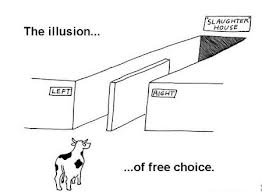
Neoliberalism attempts to convince us otherwise, but our values and actions, successes and failures are not about personal “choice;” there is no personal choice. Choice is socially constructed. Who you are and where you come from will influence exactly what “choices” are or are not available to you. Why are so many young women “choosing” to masturbate with vegetables on film to promote veganism? Why is it just women “choosing” to dance on mobile stripper poles on parade floats to promote kitten adoption? Why choose sex and stripping instead of some other “choice,” such as leading a protest, composing a song, or writing a book? The answer lies in the unequal allocation of opportunities and possibilities across demographics. Sex and stripping are the “choices” forced on women, while leadership and innovation (activities that respect the personhood of activists instead of objectifying them) are reserved for men.
Making it all about the “individual” also means prioritizing one’s privilege to engage certain behaviors at the expense of other less fortunate groups who suffer as a result. Middle-class, cis gender, able-bodied, white women represent our movement with their thin, sexy forms, but where are the women of color? Where are the women of size? That’s right: they don’t get to be sexy. What about their “choice?” There is none. Not everyone is granted the “choice” to participate in the so-called “sexual revolution.” Women from less advantaged demographics who do participate are disproportionately vulnerable to shaming and stigmatization.
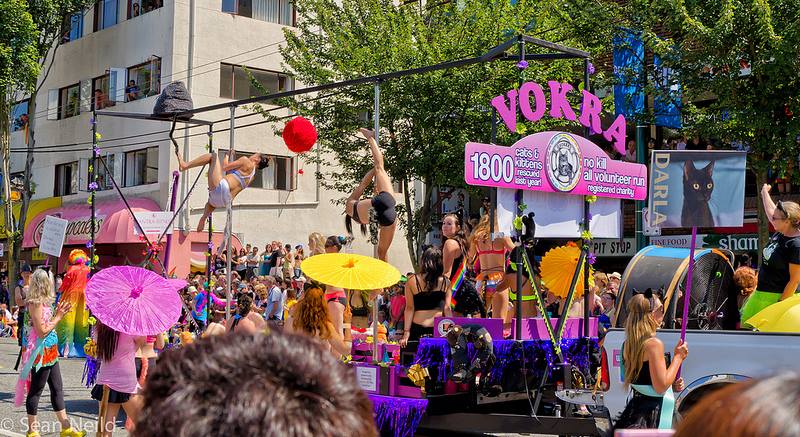 Relatedly, the sexual objectification of women and the consumption of pornography is linked to increased violence and rape against women. Take a guess which women experience the highest rates of violence and rape? The privileged able-bodied white cis women who dominate naked protest? Nope, guess again. It is actually women of color, poor women, lesbian women, trans women, disabled women, and other vulnerable women pay the price of white women’s “empowerment.” Privileged young white women can enter public spaces, flaunt their sexuality, and find it “liberating,” but it’s the masses of poor and disadvantaged women who are not allowed to participate who also bear the brunt of that “liberation” through rape, sexual harassment, and beatings.
Relatedly, the sexual objectification of women and the consumption of pornography is linked to increased violence and rape against women. Take a guess which women experience the highest rates of violence and rape? The privileged able-bodied white cis women who dominate naked protest? Nope, guess again. It is actually women of color, poor women, lesbian women, trans women, disabled women, and other vulnerable women pay the price of white women’s “empowerment.” Privileged young white women can enter public spaces, flaunt their sexuality, and find it “liberating,” but it’s the masses of poor and disadvantaged women who are not allowed to participate who also bear the brunt of that “liberation” through rape, sexual harassment, and beatings.
Listen up, it’s a trick. The “individualization” of social advocacy divides. It masks privilege, otherizes, and excludes disadvantaged groups. Neoliberalism is what created the problem (speciesism) in the first place, so why would we think that digging in deeper with neoliberalism would fix it? Neoliberalizing our movement means we lose our collective power. When we play by the rules of this patriarchy with the bizarre assumption that we can only get people to drop that hamburger if they get a hard on, then we simply reinforce oppression.
We surrendered our power; we repackaged our social justice claimsmaking for pornified Playboy-speak.
|
Neoliberalism has co-opted our movement. We surrendered our power; we repackaged our social justice claimsmaking for pornified Playboy-speak. Instead of loudspeakers, pens, and protests, it’s thongs, bums, and boobs. This isn’t a social movement anymore, it’s quelled resistance. Not only are we disempowered, but we’re exploited further because we become another site of sexual objectification. The system not only gets us to shut it up, but it gets us to take it off, too. Take, for example, this Playboy image. Porn? Or Liberation?
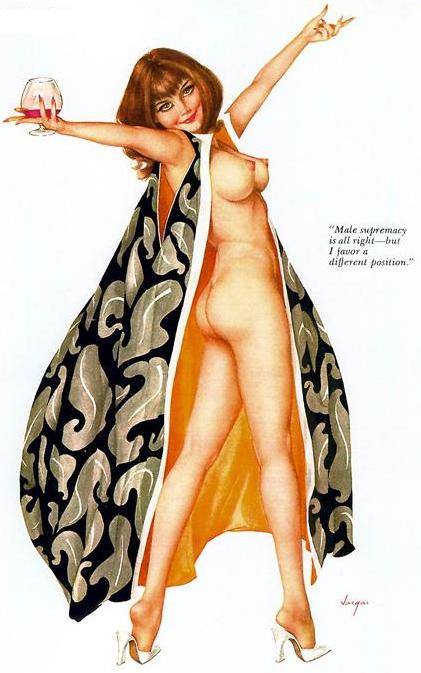
The caption reads, “Male supremacy is fine–but I favor a different position.” The feminist position or a sexual position? Porn? Or liberation? Having trouble deciding? You should, because there is no difference.
Feminism is being repackaged in a way that absolutely eliminates any female threat to male power, it is being repackaged in a way that benefits men. Women are stripping and performing for patriarchy, and they’re doing it willingly. They’re doing it under the mistaken assumption that they’re liberated, as though they are acting of their own free will and individual choice.
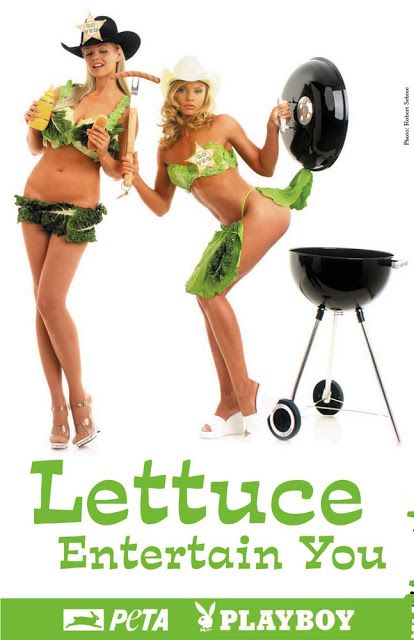
The cult of “free choice” is so powerful in the Nonhuman Animal rights movement that some of the most ridiculous stunts can be approved of and protected by the movement, even when faced with public feedback and scientific research demonstrating that these tactics do not work, discredit the movement, and hurt women as a group. PETA regularly hires Playboy “bunnies” to perform their pornographic demonstrations. There’s even a vegan pinup website and a vegan strip club. It’s liberating!
See the adjacent PETA/Playboy pinup as an example. “Lettuce entertain you.” Get it? Veganism or sexual favors? Which is it? Serious social movement, or more patriarchal noise in the crowded pornography landscape of Western culture? Confused? You should be.
 Dr. Wrenn is Lecturer of Sociology. She received her Ph.D. in Sociology with Colorado State University in 2016. She received her M.S. in Sociology in 2008 and her B.A. in Political Science in 2005, both from Virginia Tech. She was awarded Exemplary Diversity Scholar, 2016 by the University of Michigan’s National Center for Institutional Diversity. She served as council member with the American Sociological Association’s Animals & Society section (2013-2016) and was elected Chair in 2018. She serves as Book Review Editor to Society & Animals and has contributed to the Human-Animal Studies Images and Cinema blogs for the Animals and Society Institute. She has been published in several peer-reviewed academic journals including the Journal of Gender Studies, Feminist Media Studies, Disability & Society, Food, Culture & Society, and Society & Animals. In July 2013, she founded the Vegan Feminist Network, an academic-activist project engaging intersectional social justice praxis. She is the author of A Rational Approach to Animal Rights: Extensions in Abolitionist Theory (Palgrave MacMillan 2016).
Dr. Wrenn is Lecturer of Sociology. She received her Ph.D. in Sociology with Colorado State University in 2016. She received her M.S. in Sociology in 2008 and her B.A. in Political Science in 2005, both from Virginia Tech. She was awarded Exemplary Diversity Scholar, 2016 by the University of Michigan’s National Center for Institutional Diversity. She served as council member with the American Sociological Association’s Animals & Society section (2013-2016) and was elected Chair in 2018. She serves as Book Review Editor to Society & Animals and has contributed to the Human-Animal Studies Images and Cinema blogs for the Animals and Society Institute. She has been published in several peer-reviewed academic journals including the Journal of Gender Studies, Feminist Media Studies, Disability & Society, Food, Culture & Society, and Society & Animals. In July 2013, she founded the Vegan Feminist Network, an academic-activist project engaging intersectional social justice praxis. She is the author of A Rational Approach to Animal Rights: Extensions in Abolitionist Theory (Palgrave MacMillan 2016).
Receive research updates straight to your inbox by subscribing to my newsletter.
 Dr. Wrenn is Lecturer of Sociology. She received her Ph.D. in Sociology with Colorado State University in 2016. She received her M.S. in Sociology in 2008 and her B.A. in Political Science in 2005, both from Virginia Tech. She was awarded Exemplary Diversity Scholar, 2016 by the University of Michigan’s National Center for Institutional Diversity. She served as council member with the American Sociological Association’s Animals & Society section (2013-2016) and was elected Chair in 2018. She serves as Book Review Editor to Society & Animals and has contributed to the Human-Animal Studies Images and Cinema blogs for the Animals and Society Institute. She has been published in several peer-reviewed academic journals including the Journal of Gender Studies, Feminist Media Studies, Disability & Society, Food, Culture & Society, and Society & Animals. In July 2013, she founded the Vegan Feminist Network, an academic-activist project engaging intersectional social justice praxis. She is the author of A Rational Approach to Animal Rights: Extensions in Abolitionist Theory (Palgrave MacMillan 2016).
Dr. Wrenn is Lecturer of Sociology. She received her Ph.D. in Sociology with Colorado State University in 2016. She received her M.S. in Sociology in 2008 and her B.A. in Political Science in 2005, both from Virginia Tech. She was awarded Exemplary Diversity Scholar, 2016 by the University of Michigan’s National Center for Institutional Diversity. She served as council member with the American Sociological Association’s Animals & Society section (2013-2016) and was elected Chair in 2018. She serves as Book Review Editor to Society & Animals and has contributed to the Human-Animal Studies Images and Cinema blogs for the Animals and Society Institute. She has been published in several peer-reviewed academic journals including the Journal of Gender Studies, Feminist Media Studies, Disability & Society, Food, Culture & Society, and Society & Animals. In July 2013, she founded the Vegan Feminist Network, an academic-activist project engaging intersectional social justice praxis. She is the author of A Rational Approach to Animal Rights: Extensions in Abolitionist Theory (Palgrave MacMillan 2016).
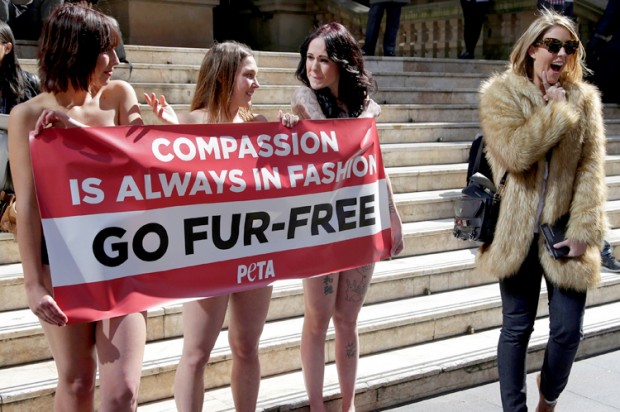


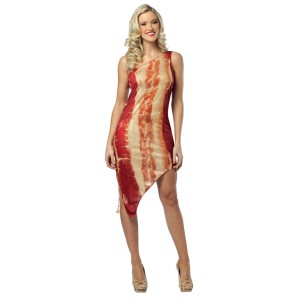


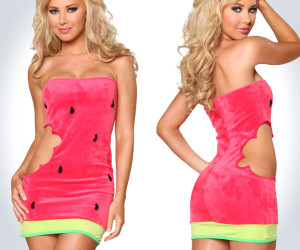



 Relatedly, the sexual objectification of women and the consumption of pornography is linked to increased violence and rape against women. Take a guess which women experience the highest rates of violence and rape? The privileged able-bodied white cis women who dominate naked protest? Nope, guess again. It is actually women of color, poor women, lesbian women, trans women, disabled women, and other vulnerable women pay the price of white women’s “empowerment.” Privileged young white women can enter public spaces, flaunt their sexuality, and find it “liberating,” but it’s the masses of poor and disadvantaged women who are not allowed to participate who also bear the brunt of that “liberation” through rape, sexual harassment, and beatings.
Relatedly, the sexual objectification of women and the consumption of pornography is linked to increased violence and rape against women. Take a guess which women experience the highest rates of violence and rape? The privileged able-bodied white cis women who dominate naked protest? Nope, guess again. It is actually women of color, poor women, lesbian women, trans women, disabled women, and other vulnerable women pay the price of white women’s “empowerment.” Privileged young white women can enter public spaces, flaunt their sexuality, and find it “liberating,” but it’s the masses of poor and disadvantaged women who are not allowed to participate who also bear the brunt of that “liberation” through rape, sexual harassment, and beatings.




